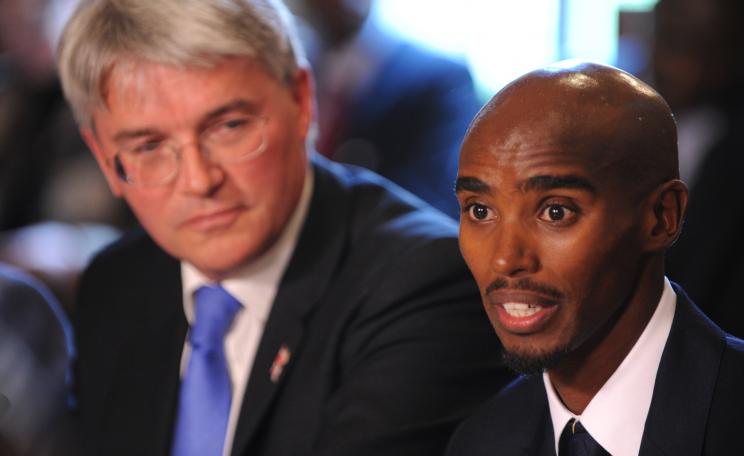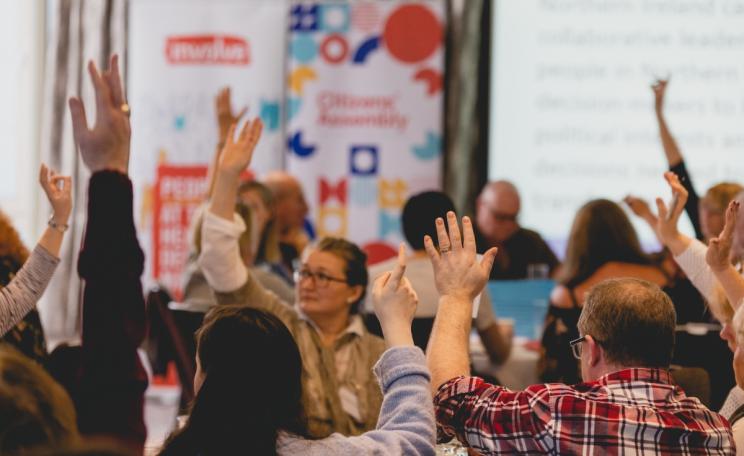Samia Yusuf Omar, 21, was another Olympic athlete who left Somalia to reach Europe. She drowned while trying to cross from Libya to Italy in a migrant boat.
The world still lacks a system where those who create the pressure to migrate adopt responsibility for the problems they’ve created.
Read the first part of Andrew Simms' essay here.
Rich country policies that create a hostile environment towards migrants appear even more cruel and indefensible seen in the light of colonial crimes and legacies. Nowhere is this clearer than in the South Pacific.
When the Intergovernmental Panel on Climate Change began its work in the late 1980s, the island of Nauru in the South Pacific was named among the world’s vulnerable nations, living on the front line of global warming.
Extraction
What happened on Nauru can be seen as a cautionary tale for what is happening to the world as a whole. If we do to the world what the world has done to Nauru, there won’t even be anywhere to migrate to.
The earliest encounters between the people of Nauru and Western laws, habits and values came from European whaling vessels and traders. The Europeans named it Pleasant Island, and brought with them a colonial cocktail of theft, guns, alcohol and sexually transmitted disease.
Nauru was discovered by Europeans in colonial times to contain massive phosphate deposits built up from bird droppings over thousands of years that were hugely valuable as fertiliser to farmers back home who had exhausted their own soils. In just a few generations, the island’s ore was mined for exports almost to the point of destruction.
Money was made, but the island’s centre was left a hollow shell and its people became dependent on expensive imports. They suffered major health problems and when the phosphate ran out they had no livelihood.
Then, in 1900, a Pacific prospector called Albert Ellis arrived having chanced upon an example of fossilised rock phosphate from the island, triggering decades of extraction and exploitation from which islanders would receive only paltry sums.
Hard-line
Ellis went on to get a knighthood and was appointed commissioner for New Zealand with the British Phosphate Commission.
The local people of Nauru got just two percent of the proceeds from their natural capital in the form of a trust fund, whose administration they were also charged for.
They were also left with a legacy of having one of the world’s highest levels of diabetes, renal failure and heart disease, life expectancy in the 50s and a home reduced to a barren wasteland.
Kinza Clodumar, president of Nauru from 1997 to 1998, lamented: "What was once a tropical paradise was changed to a jagged, uninhabitable desert of coral tombstones. Our sad history serves as a poignant example for the rest of the world of what can happen when humans disregard the good earth that sustains us."
Down on its luck, the island was exploited again when, in 2001, Australia co-opted Nauru into its controversial, hard-line attempt to control immigration. The policy was called the Pacific Solution, demonstrating extraordinary historical insensitivity.
Samia Yusuf Omar, 21, was another Olympic athlete who left Somalia to reach Europe. She drowned while trying to cross from Libya to Italy in a migrant boat.
Precarious
The government of Australia determined to intercept at sea as many inbound refugees as possible and to house and process them in centres in regional neighbouring countries. Australia paid Nauru to hold around 1,000 refugees in conditions that the human rights group Amnesty International described as inhuman.
The Australian minister for immigration likened their imprisonment to a holiday in "paradise", although it is unclear whether at that point he had actually visited Nauru. An Australian promise to remove asylum-seekers from Nauru’s detention centres in 2002 was broken and conditions remained bad enough in 2003 for some to go on hunger strike in protest.
At the same time, expatriate workers from the exhausted phosphate mines were being sent home. To complete the irony, some of the mine workers being sent home were from Tuvalu, another small island Pacific nation even more threatened by global warming and sea-level rise than Nauru.
Each year during high tides, large parts of Tuvalu’s main inhabited island, Funafuti, disappear under water. In the face of long-term projections for climate change, Tuvalu had previously approached Australia to investigate the prospects for a gradual relocation of some of its most threatened inhabitants.
Tuvalu has a small population of 9,000 t010,000 and yet it was rebuffed by Australia. The policy of the Pacific Solution was ended in 2007, but the future of many of the small island states grows more and more precarious.
Money walks
It’s easier for money to get in and out of the UK than it is for ordinary people to migrate across its border. So much so, in fact that people with money can cross much more easily than those without.
The UK and British overseas territories combined are at the top of the international league of countries that allow money to be moved to avoid paying tax.
The Queen presides over the world's largest network of ‘tax havens’. These islands are better understood as "secrecy jurisdictions" as they allow money to be moved and hidden without any form of public scrutiny or accountability. Until February 2022 it was also possible to get a UK visa by holding in-country investments of £2m.
Ha-Joon Chang, an economist, points out that a world geared to the free movement of money and goods, but with restrictive immigration policies, means a bus driver in Sweden can get paid 50 times more than his or her counterpart in India for doing a probably less stressful and/or demanding job.
In spite of this, if anyone seeks to improve their economic position and life chances by moving from the Global South to contribute their labour to the UK, they are typically dismissed by voices on the right as ‘economic migrants’.
The irony is lost on such commentators that modern Britain was built by generations of British economic migrants who, under the cloak of colonialism, roamed the violently conquered empire enriching themselves, usually at the expense of local populations.
Hate mongering
In spite of all these realities, migrants, and especially non-white migrants, are faced with a wall of poisonous media hostility in the UK, where right wing media dominate daily newspapers and online news platforms.
A study by Cardiff University’s Journalism School looked at how the migration issue was covered by media across Europe, and found that the British press reporting was especially "polarised and aggressive".
The majority of these platforms "consistently endorsed a hard-line anti-refugee and anti-migrant, Fortress Europe approach" and such themes were "continuously reinforced through the angles taken in stories, editorials and comment pieces".
Do an online image search and there are numerous composite images of the relentlessly anti-migrant front pages published by papers like the Daily Mail, Express and Telegraph.
Work
Over time these build into an alternate reality in which Britain builds a picture of itself as an innocent, much put-upon, victim nation under attack from predatory interlopers.
The UK’s politically motivated hostile environment both drew from this toxic pool of ‘othering’ and poured more divisiveness into it.
A poignant cartoon circulating online nailed the resulting confusion in the minds of some British people. Against a diagram of what actually makes up the cost of a litre of fuel - retail profit, VAT, fuel duty, cost to supplier etc - was another showing "what makes up the cost according to the Daily Mail". The list included "single mothers, woke people, immigrants". Like the best jokes it was painfully close to the truth.
One reason that this amounts to kind of officially-sanctioned dysmorphia for the body of British politics - where what is described as a huge problem is barely visible to anyone outside - is that the country could not function without people from other nations being willing to come and work here.
A grateful nation?
Without inward migration, the UK’s hospitals, schools, farms, pubs, care homes and restaurants could not function. People born in other countries make up almost one in five of the UK employed population.
For a nation that removed itself from the European Union, large sections of its significantly service-driven economy found themselves suddenly exposed and in danger of losing essential workers.
For example, in the hospitality sector 75 percent of waiting staff and 25 percent of chefs were from the EU, alongside 37 percent of housekeeping staff. About one in six people working in tourism were non-British nationals, with similar numbers of migrant workers supporting the health sector.
Distraction
The Refugee Council points out that “about 1,200 medically qualified refugees are recorded on the British Medical Association’s database. It is estimated that it costs around £25,000 to support a refugee doctor to practise in the UK. Training a new doctor is estimated to cost between £200,000 and £250,000.” There are complicated issues involved with this.
In education, about one in eight school staff in England were born outside the UK. When it comes to the nation feeding itself, there were 143,000 EU nationals working in UK farming and food manufacturing before Brexit.
Immigrants also tend to make a disproportionately positive local economic contribution, often triggering cycles of regeneration in run down urban areas. In the words of Hamilton, the musical, they "get the job done".
But the articulation of migration as an issue in politics works in a number of other ways. It is used by political populism to divide, rule and cynically bolster support in particular constituencies. But it also works as a distraction from policy failures.
Policy failures feeding hostility
Certain issues are renowned flashpoints to do with inward migration. Usually they ignite around unfounded but nevertheless keenly felt concerns about preferential treatment with regard to housing, or unfair access to jobs or services.
The presence or not of refugees or migrants makes little actual difference to the provision of services to those in need in the UK. Discontent in society comes from frustrations and dissatisfaction arising from social inequality. People cannot afford basics like food and heat, or life's little luxuries. The reasons for such unmet needs lies elsewhere. But migrants are a useful scapegoat - an other in view.
Housing is one such flashpoint. Local authorities across Britain managed to build more than 200,000 homes per year as social housing when Britain was still economically broken and rebuilding from the Second World War in the 1950s and 1960s - under both Conservative and Labour governments.
Today only 6,500 social homes were built in England in 2020 whilst 1.1 million people are waiting for social housing. This is a political decision - with governments supporting the private housing market which is geared towards financial speculation and rent extraction.
Scapegoat
The current housing emergency now affects one in three adults in Britain - approximately 17.5 million people lacking adequate, secure accommodation, according to the housing charity Shelter. Housing is a major example of policy failure that contaminates other issues.
Then in the long shadow of the finance and banking crises of 2007-2008 – another policy and regulatory failure – the political and heavily ideological choice to impose austerity has had a huge impact on other services.
Conditions that have been further worsened by the imposition of Brexit – itself partly the result of politically exploited xenophobia.
Everything from schools to swimming pools and libraries – all basic public assets contributing to health, well-being and the essentials of a good society – face continuing huge cuts.
We might add to all of this the failure to implement any green stimulus package that could ‘level up’, create jobs in every constituency in the country, improving homes and lowering energy bills through an energy retrofit programme.
While this has been going on, however, the average pay of the bosses of Britain’s biggest companies in the FTSE 100 index, has bounced back to pre-pandemic levels – to a median of £3.6 million.
It’s hardly surprising that people are fed up, nor that - given the background conditions - it is easy for politicians and the right wing press to scapegoat incoming migrants.
A climate race to win
The charge sheet grows. Ignoring its responsibilities for causing human movement around the world, some political forces in the UK provoke and exploit hostility towards people who have been forced to flee, or who even quite legitimately want to contribute to the fabric of UK life.
The issue of migration is wilfully and cruelly misrepresented in public debate and used to misdirect and distract from failures in other economic and policy areas.
During their campaigns to replace Boris Johnson as leader of the Conservative party and Prime Minister, the two final candidates, Rishi Sunak and Liz Truss, both re-affirmed their support for the policy of sending asylum seekers to Rwanda.
This was even after the Home Office was accused by children’s charities of attempting to deport unaccompanied minors – children - to Rwanda, and after the UN High Commission for Refugees twice warned the Home Office that its policy was illegal.
The UK needs to stop the cruel exploitation of migration as an issue, stop lying about it, and live up to its existing international obligations to help and protect those in need who are forced across borders.
Trafficked
But in the light of its historical and current responsibilities for creating ‘push factors’ for human movement, it should be doing much more.
The UK should be pioneering a new, humane and properly resourced international social contract to manage the inevitable rise in migration that global heating will bring.
If the question of resources comes up, one attractively logical option would be to pay for the cross-border movement of people by taxing the cross border movement of finance in international currency trading.
We should also detoxify and roll back the hostile environment by growing and supporting the movement to welcome migrants, and recognise and applaud their contributions to culture, key services, community, and the economy.
When Mo Farah heard that the Home Office would take no action against him after he admitted being trafficked into the UK as a child under an assumed name, he said he was “relieved”. It was the right decision, but also an exception.
Fires
The initiative United Against Refugee Deaths has been tracking data related to Europe’s restrictive immigrations policies. It finds that the approach of Fortress Europe has, in the period 1993 – 2022, been implicated in at least 48.647 documented refugee deaths, a horrifying statistic of human indifference.
Global heating is touching everything - including the sport where Farah’s excellence earned him rare UK leniency as a migrant. International athletics events are likely to have to move according to the head of World Athletics, Sebastian Coe.
Coe was speaking on the eve of the UK’s hosting of the Commonwealth Games – a voluntary association of 56 countries,including many living with the legacy of the UK’s colonial era, as well as the legacy of its carbon emissions.
In fact, climate change is already affecting sports events. The Tokyo 2020 Olympics were forced to move long distance running events north of the capital as the city’s sweltering summer weather now makes them impossible to run.
In 2019, the Rugby World Cup was disrupted by unprecedented Pacific typhoons and in early 2020, the Australian Tennis Open met disarray due to the smoke blowing in from the country’s devastating bush fires.
Borders
And not just sporting events are having to move, athletes are too. Samia Yusuf Omar was another Olympic athlete who, like Mo Farah, left the complex crises of Somalia to reach Europe.
Unlike Farah she didn’t make it. Just 21 years old, Samia drowned ten years ago in 2012, while trying to cross from Libya to Italy in a migrant boat.
She became one of the many statistics of avoidable tragedy, the result of a political system in denial about the necessity of human movement across borders.
Mo Farah’s treatment as a migrant into the UK is the exception that proves the cruel rule and need for change.
This Author
Andrew Simms co-authored the pamphlet Environmental refugees: the case for recognition in 2003. He is co-director of the New Weather Institute, coordinator of the Rapid Transition Alliance, and the Cool Down – sport for climate action network, author of several books on new and green economics and co-author of the original Green New Deal. He is on twitter at @AndrewSimms_uk.
Read the first part of Simms essay here.







